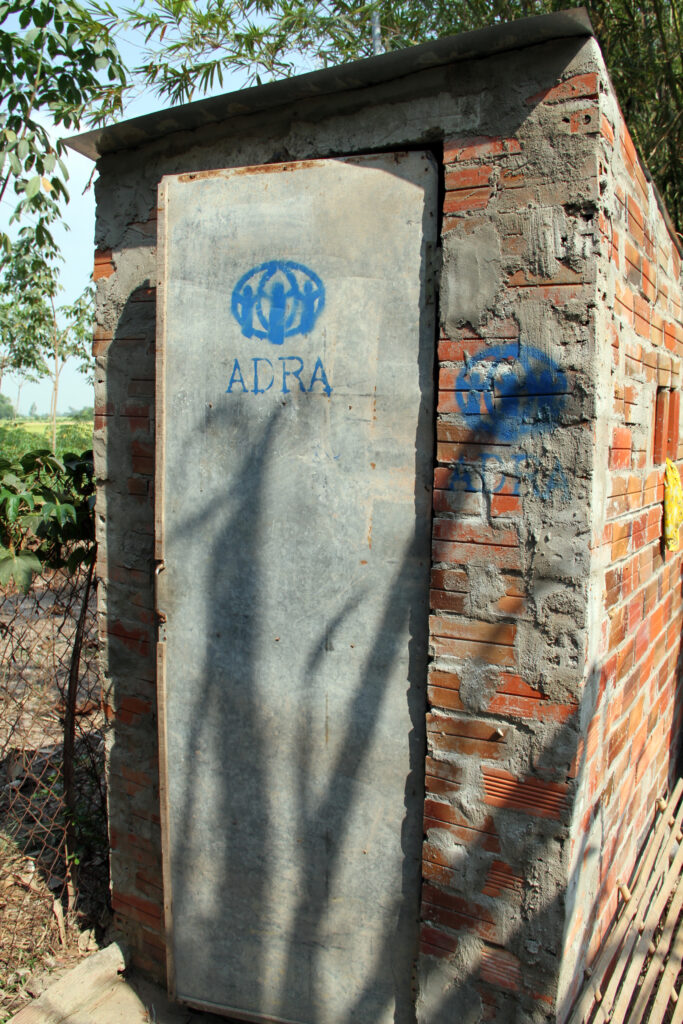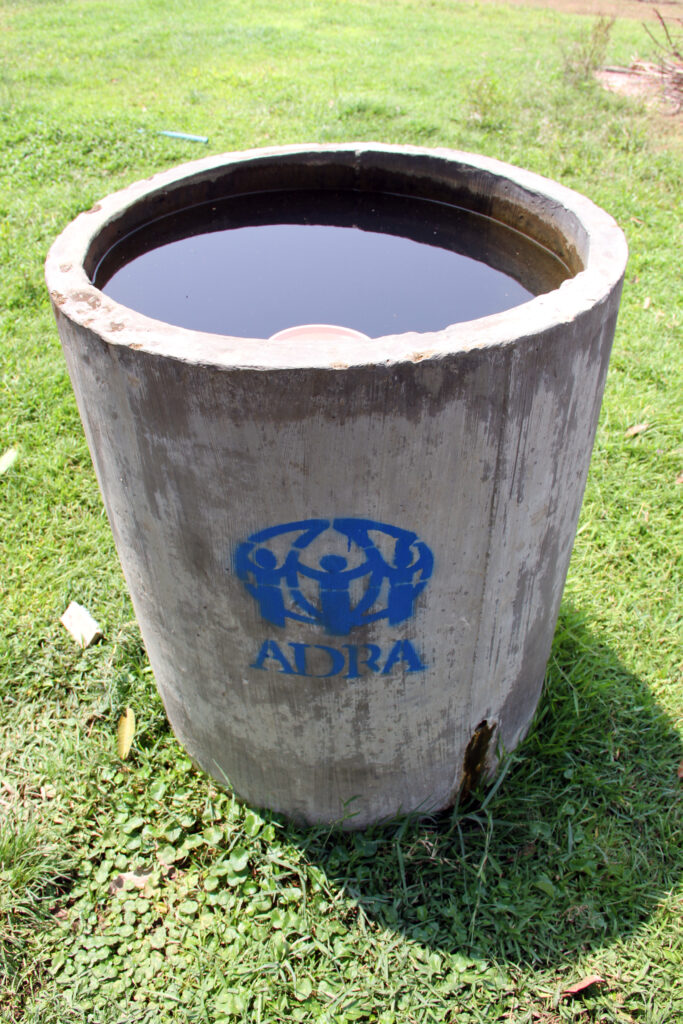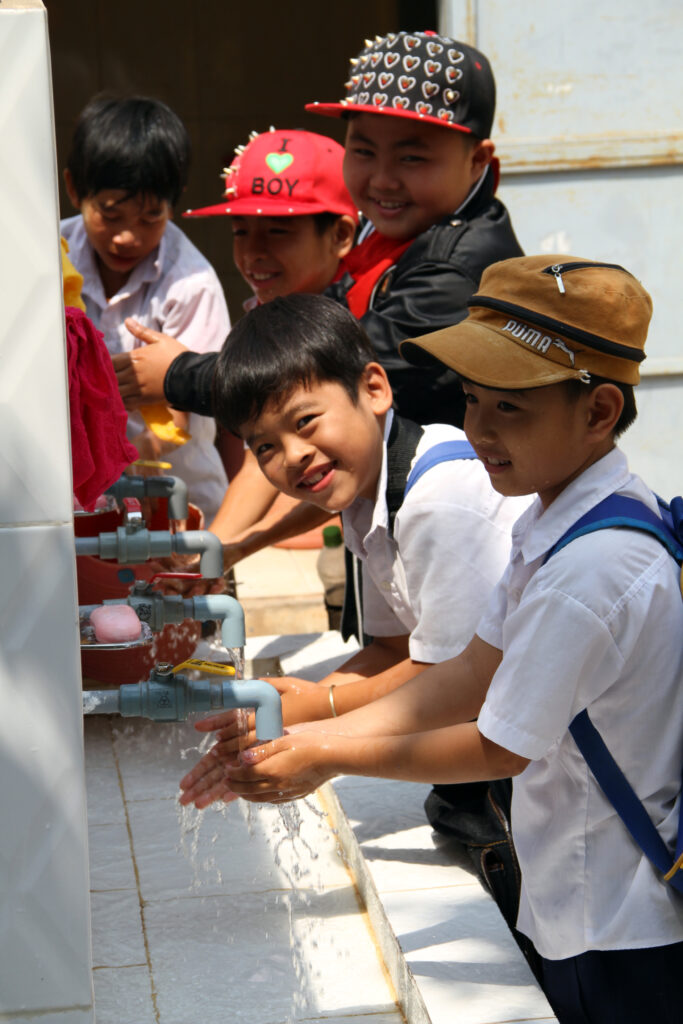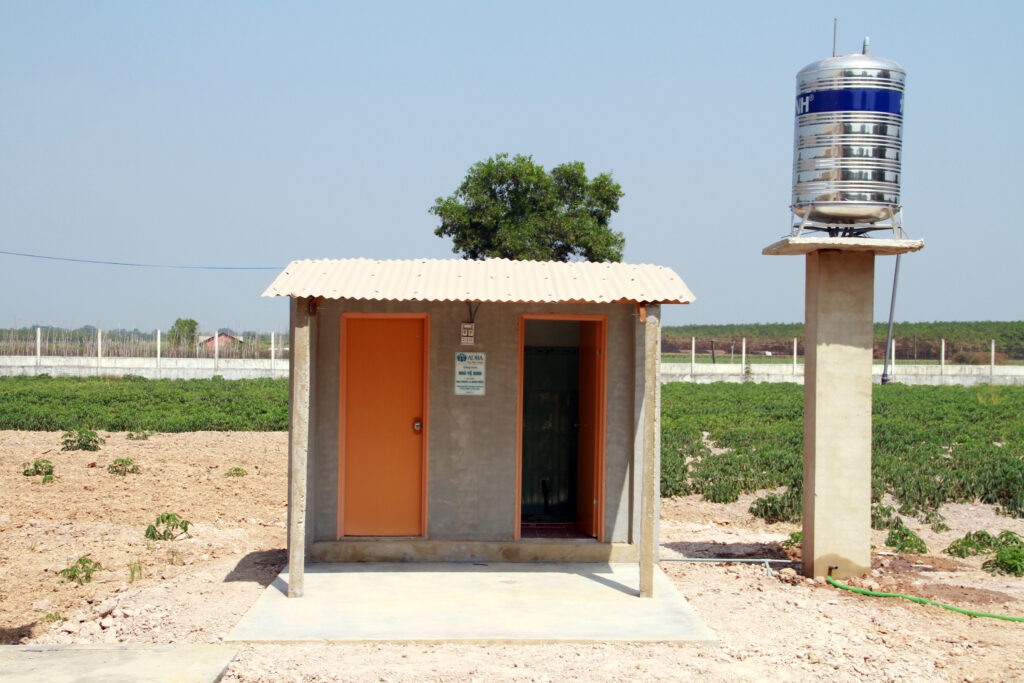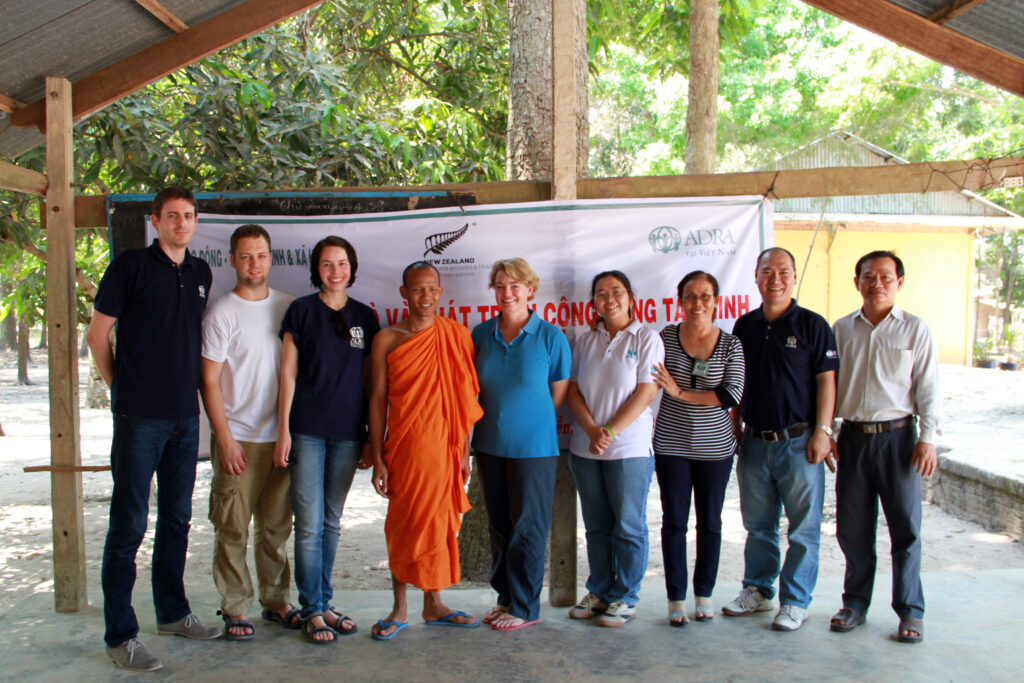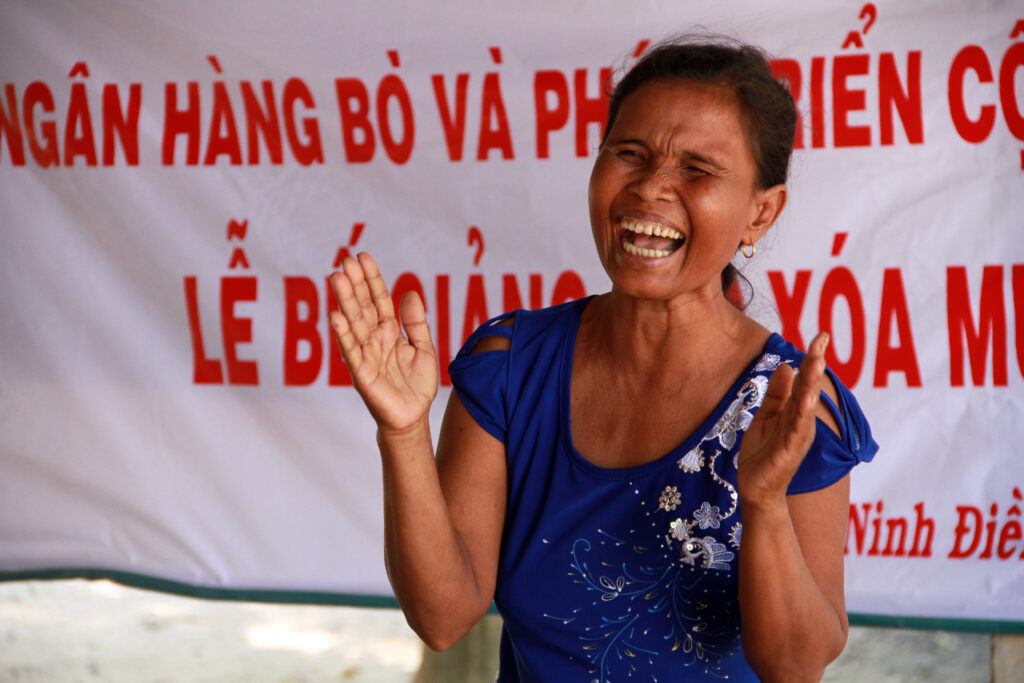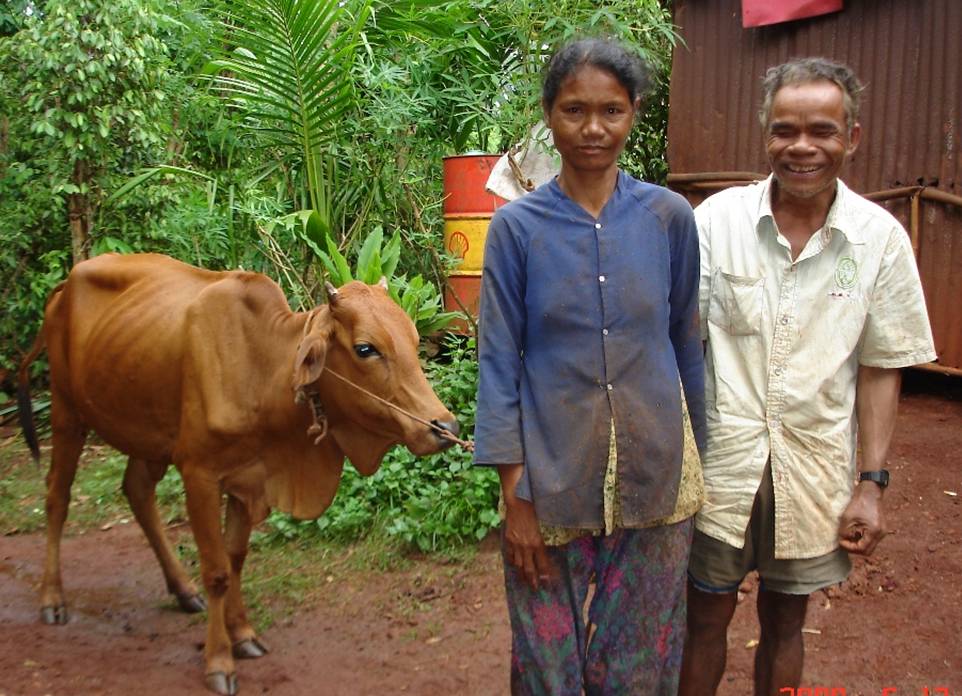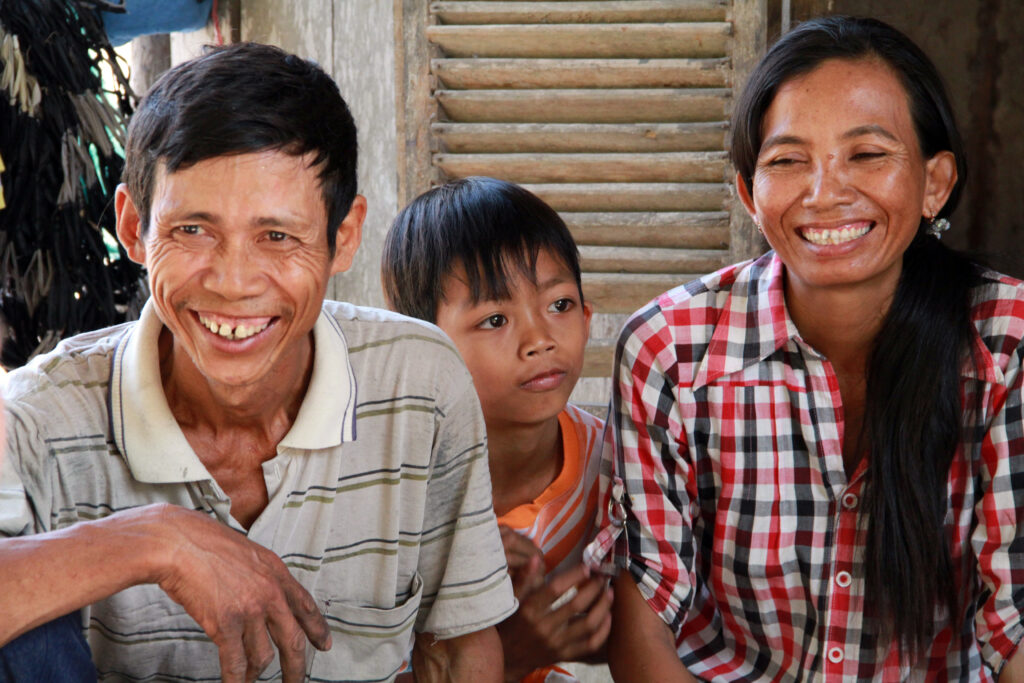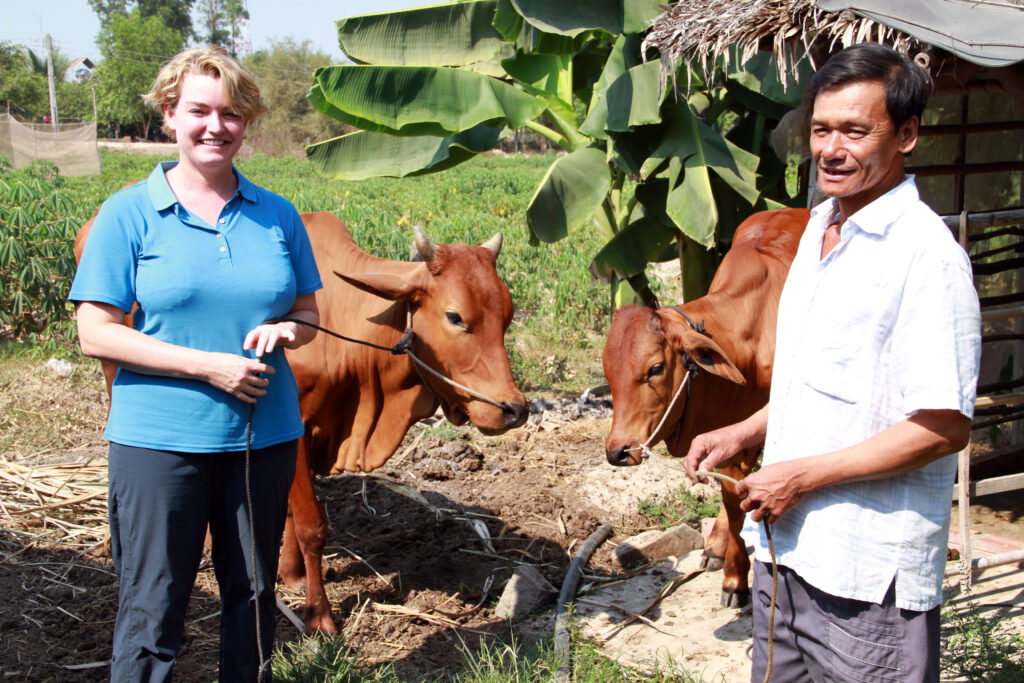The project aims at enhancing the long-term livelihood security of poor households residing in Tay Ninh Province, who were identified of lacking opportunities to improve their living conditions through accessing the income-generation funding source and increasing knowledge.
Over the last month, the ADRA staffs have worked tirelessly in the field, boosted the implementation of Cow Bank and conducted different activities on Community Development.
Of the first component, the project has stepped into the third year and there have been 84 in total of cows lent. This figure means a lot to us, since the next rotation of calves’ generation has gained significant results: 14 calves have been loaned to other impoverished cases. Besides, initial trainings have been adjusted to experience-sharing, calling upon the participant of very first and current borrowers. In order to intensify the livestock husbandry, supplementary trainings with the provincial veterinarian were also provided two times in August. Throughout trainings, all the questions and opinions were welcome, concerns of different issues concerning livestock were endeavored to be solved; participants therefore expressed great pleasure and excitement on the next event.
Of the second content, community development was boosted through social and economic initiatives surrounding the cow bank. ADRA Vietnam has funded 50 income-generation models; simultaneously carry on trainings themed Household Economic Management and community exchange events. Those activities have brought lots of families into active response, added up new know-how and helped the models develop in a more sustainable way.
Additionally, health care and education were put into focus. There were 21 communication events emphasizing on Dengue Fever with 730 attendees in total conducted; of this remarkable figure, 60% were women and 54 were ethnic minority people mobilized to involve. Clean water facilities gained 150 work done, improving the traditional perception and habit about hygiene of the locals, contributing the environmental improvement. Last but not least, the class of illiteracy eradication has been maintaining regularly in every ward, lightening up the horizon of knowledge to the people lacking chance.
Project Name: Tay Ninh Cow Bank and Community Development (CBCD Tay Ninh)
Duration: 03 years (June 2011 – March 2014)
Donor(s): ADRA New Zealand
Location: Tay Ninh Province (Ben Cau and Chau Thanh districts)
Sector: Livelihood
Beneficiaries: At least 2,350 farmers, school children, members of Women Union and staffs of local authorities in two project areas
Main partners: Department of Labor, Invalid & Social Affairs – Tay Ninh Province (DOLISA), Farmer’s Association – Tay Ninh Province (FA), Women’s Union – Tay Ninh Province (WU), Department of Education and Training – Tay Ninh Province (DOET), Department of Health – Tay Ninh Province (DOH, People Committees of the districts and relating communes (PCs).
Project Goal:
To reduce poverty through improving livelihood security for poor farmers in Tay Ninh Province.
Expected Outcomes:
- Improving income sources for poor farmers and their families in Ben Cau and Chau Thanh districts of Tay Ninh province through provision of cow loans;
- Developing the community through socio-economic initiatives built around the Cow Bank including the Community Development Clubs with the pilot initiatives on income generation and other livelihood improvement activities; Building capacity for key local stakeholders.
Main Activities:
- 42 Farmer Groups (FG) are established in 2 districts
Based on the survey during the proposal period, two districts of Tay Ninh province have been selected for implementation of the project activities. At each district, the two poorest communes with the most serious social issues of clean water access, health, education, child & woman rights protection will be selected.
At the 4 communes, 22 farmer groups of 5 to 6 members for the first year and 10 additional groups for each of the following years will be formed, trained and assisted to implement SED through cow loans from the cow bank to the members.
The number of members within the FGs is flexible. The FG members who improve in financial status can withdraw from the FGs. The available spaces at the FGs will be given to other suitable poor farmers in the community. Similar benefits will be provided to the newly joining members.
- Technical training and other supports are provided
Baseline and year end surveys with recommended training plans on technique gaps among FG members and community members will be conducted accordingly; initial trainings will be provided to 100% of FG members in cow husbandry including cow selecting, vaccination, feeding, shelter construction, manure treatment and usage, care for pregnant cows and calves.
During the loan borrowing period the loan receivers will continue get support from the project, cow bank, FG members, AHWs, AEWs through monitoring visits, follow up training on caring for pregnant cows, care of baby calves, etc.
Project staff, PWG, CACGs, AHWs, AEWs will closely monitor the growth of the loaned cows and provide technical and timely assistance concerning cow care, epidemic control, etc.
- Cow bank is established and cow loans provided to trained farmers
A cow bank will be established in the form of small enterprises at each projected commune. The bank will be operated by CACGs within the commune. ADRA’s existing cow bank manual will be reviewed for localization and put in place and applied for all the banks. Livestock needs assessment for loans in the community and the capital of the bank will be transferred from the project to the bank accordingly. The CACG members will be trained on the SED of banking technique. ADRA in Vietnam and PWG members will act as control members to the banks to ensure the firm operation and the transparency of the banks. Annual auditing will be conducted at the cow banks with ADRA in Vietnam’s Financial Department’s coordination.
Identification of farmer households for appropriate loans shall be done strictly according to the bank manual with participatory selection for the FG members. It is estimated that at least 220 loan packages will be provided and 95% of loan recipients will pay back the loans according to agreed project terms and 60% of loan recipients will have started or expanded their livestock income sources.
According to the Cow Bank manual the FGs will select the members who are able to receive loans during the first round and the members for the next rounds respectively. During the first round of loaning, about a half of the FG members will receive a direct loan in the form of a female cow which is able to give calves later on. Until a first round loan receiver raises a 12 month old female calf she/he will be eligible to give the female calf back to the cow bank for the next round. Then she/he will permanently own the female cow as property for poverty reduction. The cycle will then be applied to the next round of loan receivers. It is estimated that 95% of FG members will obtain the cow loan and remain with the groups through the project life;
- Community Development Clubs (CDCs) are established, in close connection with Farmer Groups, to discuss and identify solutions to community social issues.
At least 2 CDCs are established and function in each projected commune. Developing the community through the socio-economic initiatives of the community development clubs, developed through the pilot initiatives, to resolve the local social issues of clean water access, health, education, child and woman rights protection. The clubs are formed at the communes and include the core members from FGs and all those who are interested within the communities. Two meetings per month of each CDC are conducted and discuss the current issues of the communities and the solutions/initiatives that fit with the CDC plans; the solutions/initiatives are applied with the efforts of the whole community in which the CDC members are the core;
Baseline and year end surveys with the recommended action plans of the CDCs are conducted; through participatory discussion the CDCs define the local issues involving clean water access, health, education, child & woman rights protection. The recommendations from the surveys and discussion will be the basis for the CDCs to plan and implement the pilot initiatives to resolve the defined issues of the communities;
Appropriate trainings will be provided to the CDC leaders as well as the relevant stakeholders so that they are able to implement the plans and operate the clubs.
- Initiatives are piloted by the community, with financial contribution from the Cow Bank and their own resources, to reduce poverty and improve livelihood security.
The initiatives and agreed solutions are applied with the efforts of the whole community in which the CDC members are the core; CDC leaders will take the leadership in organizing the events with the assistance of the project staff, PWG and CACGs.
The poverty reduction activities may include pilot income generation models such as worm raising from the cow manure, duck or fish raising from the worms, planting vegetable with the manure, etc. The activities may have capital support from cow banks, technical trainings from the project. The funds may be under the form of grants (for small models) or refundable (for other models);
The social initiatives may include: education on clean water use, upgrading or repairing the existing water supply facilities or building the new clean water supply facilities. Sanitation facilities may also be considered to be repaired, upgraded or built to ensure better clean water access for the communities and environment protection.
However, the activities to be done will be defined by the club members themselves based on the surveys and discussions to ensure that the activities meet the actual needs of the communities and to ensure the sustainability of the project.
IEC activities will be conducted on nutrition, anti-malaria, HIV transmission, avian flu transmission, water born diseases and others epidemics in the area. The activities may include BCC, IEC material distribution, and basic materials for practicing safer health behaviours. Child sponsoring may be considered for the worst cases within the community to ensure the children are able to continue attending primary schools; literacy classes may be organized for illiterate women; BCC work will be done to educate on child rights protection, domestic violence and cross-border women trafficking.
IEC materials promoting more effective and safer farming, animal or avian raising techniques are adapted or produced and used by the CDCs; IEC materials for women and child rights protection, clean water access, environment protection, health protection are adapted or produced and used by the CDCs for raising awareness and promoting safer behaviours;
- Capacity building is conducted for selected community leaders and members
A project working group (PWG) with members from provincial and projected district DOLISAs, Women’s Union, Farmer’s Association, District People’s Committee are formed; Commune Activity Coordinating Groups (CACG) are formed at each projected commune with the lead of PC and the participation of WU, FA, CHWs, Animal Health Workers, leaders of CDCs, some FG leaders…;
Surveys with recommended training plans for these key stakeholders will be conducted; the authorities and other key stakeholders with the assistance of ADRA in Vietnam will receive capacity building on cow bank and CDC management, coordination skills for implementing all the mentioned activities. The capacity building will be done through different approaches such as in house training courses, on-the-job coaching, participatory planning and action; developing and testing a sustainability plan, etc.
The periodical project plan of activities (POA) at all the levels are prepared and implemented by members of PWGs, CACGs, CDCs and FGs with the assistance of ADRA’s project staff to ensure ownership and the meeting of the actual needs of the communities; monitoring systems are set up and implemented for and by the PWG, CACGs, CDCs, FGs; The lesson learnt from the M & E system are used for improving the project activities;
Annual review workshops are conducted by PWG to review and share information and lessons learnt to all project stakeholders and relevant agencies both within the province and with neighboring provinces.
A sustainability plan is developed at the end of year 2 and piloted for field testing during the last year of the project.


